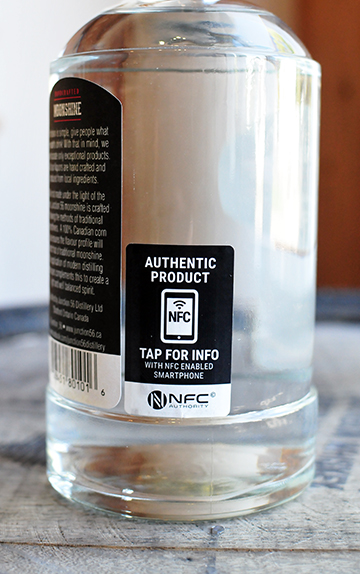If you’ve ever walked into the liquor store and noticed something new but were nervous to buy it without knowing more, a Stratford-based tech company says it has a solution.
NFC Authority has developed a tagging system for wine and spirits, and with a simple tap of your smartphone, it can serve up an information cocktail on the producer behind the bottle – from links to its social media accounts, to ingredients, and perhaps most importantly, recipes and ideas on how to mix and serve the drink.
The company recently partnered with Junction 56 Distillery in Stratford to attach these labels to bottles of the distillery’s moonshine, which are just starting to hit LCBO shelves.
“(Moonshine) is a new thing around here and you’ve got the good ol’ boys who might want to drink it straight, but other than that it’s meant to be mixed,” said Mike Heisz, owner and distiller at Junction 56, of why he likes the tag system.
“There’s lots of fear with this product, for sure.”
The technology involves a near-field communication (NFC) chip made into a sticker and attached to the side of a bottle, or hidden under the label or cork.
Unlike QR codes that require an additional app to download and scan, many Android, BlackBerry and Windows phones can read NFC chips without additional software. The iPhone 6 is NFC-equipped but is locked only for use with Apple Pay.
NFC chips also provide invaluable feedback to producers. Heisz can track how many people are scanning his bottles and where they are, instead of relying solely on LCBO sales data.
“The LCBO will tell us if someone walks away with a bottle, but we’d love to say ‘that store in Toronto had 400 people scan the bottle but only one person buy it’ – that’s a different problem and we can tackle that one,” he said.

An NFC-embedded sticker on a bottle of Junction 56
moonshine (Photo: James Jackson)
NFC Authority co-founder George Kleopa said the company grew out of his earlier business, Conceptual Pathways, and they spent 17 years in app and software development before launching NFC Authority last year.
It all started in 2012 when an ice wine exporter who wanted help solving the problem of counterfeit wine in Asia approached them. He needed a way to assure shoppers that what they were buying was authentic.
The counterfeit wine industry in Asia is a multibillion-dollar business, and in 2011 the Government of France commissioned a study on the prevalence of fake wine in China. After two years, they found that one out of every two bottles of high-end French wine in China was likely fake.
So Kleopa and his team started developing an NFC solution, which they called Vinesource, to help shoppers outsmart counterfeiters using a tool almost everyone has in their pocket – a smartphone. A broken or missing NFC chip can indicate the product isn’t authentic.
Kleopa said he considered setting up in the tech hub of Waterloo Region, but instead chose the Accelerator Centre at the University of Waterloo campus in Stratford since they were already living in town and it offered the balance he was looking for – a tech-friendly community where he and co-founder Dan Heitbohmer can raise their families.
“We’re a little bit older and not your typical startup university guys. We’ve got children and families, and Stratford has a good lifestyle,” said Kleopa, 43.
The partnership between Junction 56 and NFC Authority is natural given the 14 years Heisz, 40, spent at BlackBerry as a quality engineer. He left in 2014 to start his distillery, and in January he hired another former BlackBerry employee, James Donnelly. They’re the only full-time workers at the 5,500-square-foot former Pounder Timber Mart, which operated in the community for 110 years. Heisz also makes gin and vodka, which are sold in the distillery storefront at 45 Cambria St. in Stratford, but only his moonshine is on LCBO shelves.
With help from NFC Authority, Heisz hopes to increase production from 1,000 to 4,000 bottles per month by Christmas. It’s leaps and bounds ahead of the roughly 50 bottles he was producing weekly last year.
Depending on what the customer wants the tags to do, they can cost anywhere from 20 to 90 cents apiece to produce. NFC Authority has a patent pending on hardware that allows them to produce the tags more cheaply than their competitors, who charge anywhere from 35 cents to $1.50.
“That’s really important. I couldn’t do this for $1.30 per bottle,” said Heisz, adding he wasn’t interested in the anti-counterfeit technology at this point given his local scale of production.
The tech company may be focused on wine and spirits for now, but the people at NFC Authority have their eye on an even bigger prize – conquering the global counterfeit business that, as of 2009, was worth more than $1.7 trillion annually.
Kleopa said they’re looking at the medical marijuana industry, as well as furniture, clothing, apparel and shoes – in virtually any industry where knock-offs are a problem, their technology can be part of the solution, he said.
“It’s a wide market that we can go after,” he said.

